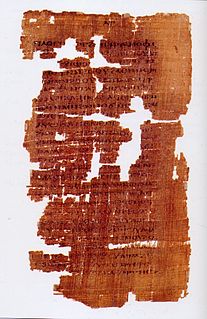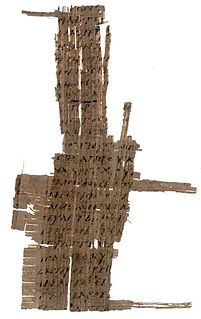
Barnabas, born Joseph (Ἰωσήφ) or Joses (Ἰωσής), was according to tradition an early Christian, one of the prominent Christian disciples in Jerusalem. According to Acts 4:36, Barnabas was a Cypriot Jew. Named an apostle in Acts 14:14, he and Paul the Apostle undertook missionary journeys together and defended Gentile converts against the Judaizers. They traveled together making more converts, and participated in the Council of Jerusalem. Barnabas and Paul successfully evangelized among the "God-fearing" Gentiles who attended synagogues in various Hellenized cities of Anatolia.

The New Testament (NT) is the second division of the Christian biblical canon. It discusses the teachings and person of Jesus, as well as events in first-century Christianity. The New Testament's background, the first division of the Christian Bible, is called the Old Testament, which is based primarily upon the Hebrew Bible; together they are regarded as sacred scripture by Christians.

Paul, commonly known as Paul the Apostle and Saint Paul, was a Christian apostle who spread the teachings of Jesus in the first-century world. Generally regarded as one of the most important figures of the Apostolic Age, he founded several Christian communities in Asia Minor and Europe from the mid-40s to the mid-50s AD.

The Second Epistle to the Corinthians is a Pauline epistle of the New Testament of the Christian Bible. The epistle is attributed to Paul the Apostle and a co-author named Timothy, and is addressed to the church in Corinth and Christians in the surrounding province of Achaea, in modern-day Greece. According to Jerome, Titus was the amanuensis of this epistle.

An epistle is a writing directed or sent to a person or group of people, usually an elegant and formal didactic letter. The epistle genre of letter-writing was common in ancient Egypt as part of the scribal-school writing curriculum. The letters in the New Testament from Apostles to Christians are usually referred to as epistles. Those traditionally attributed to Paul are known as Pauline epistles and the others as catholic epistles.

James the Just, or a variation of James, brother of the Lord, was "a brother of Jesus", according to the New Testament. He was an early leader of the Jerusalem Church of the Apostolic Age. Traditionally, it is believed he was martyred in AD 62 or 69 by being stoned to death by the Pharisees on order of High Priest Ananus ben Ananus.

The Pauline epistles, also known as Epistles of Paul or Letters of Paul, are the thirteen books of the New Testament attributed to Paul the Apostle, although the authorship of some is in dispute. Among these epistles are some of the earliest extant Christian documents. They provide an insight into the beliefs and controversies of early Christianity. As part of the canon of the New Testament, they are foundational texts for both Christian theology and ethics.

The New Testament apocrypha are a number of writings by early Christians that give accounts of Jesus and his teachings, the nature of God, or the teachings of his apostles and of their lives. Some of these writings were cited as scripture by early Christians, but since the fifth century a widespread consensus has emerged limiting the New Testament to the 27 books of the modern canon. Roman Catholic, Eastern Orthodox, and Protestant churches generally do not view the New Testament apocrypha as part of the Bible.

The Pauline epistles are the thirteen books in the New Testament traditionally attributed to Paul the Apostle.
The Gelasian Decree is a Latin text traditionally thought to be a Decretal of the prolific Pope Gelasius I, bishop of Rome from 492–496. The work reached its final form in a five-chapter text written by an anonymous scholar between 519 and 553, the second chapter of which is a list of books of Scripture presented as having been made part of the biblical canon by a Council of Rome under Pope Damasus I, the bishop of Rome from 366–383. This list, known as the Damasine List, represents the same canon as shown in the Council of Carthage Canon 24, 419 AD. The fifth segment of the work includes a list of distrusted and rejected works not encouraged for church use.

Antilegomena are written texts whose authenticity or value is disputed. Eusebius in his Church History used the term for those Christian scriptures that were "disputed", literally "spoken against", in Early Christianity before the closure of the New Testament canon.

The First Epistle of Clement is a letter addressed to the Christians in the city of Corinth. Based on internal evidence some scholars say the letter was composed some time before AD 70, but the common time given for the epistle's composition is at the end of the reign of Domitian. It ranks with Didache as one of the earliest, if not the earliest, of extant Christian documents outside the traditional New Testament canon. As the name suggests, a Second Epistle of Clement is known, but this is a later work by a different author. Part of the Apostolic Fathers collection, 1 and 2 Clement are not usually considered to be part of the canonical New Testament.
The New International Greek Testament Commentary is a series of commentaries in English on the text of the New Testament in Greek. It is published by the William B. Eerdmans Publishing Company. The current series editors are Todd D. Still and Mark Goodacre.
The New International Commentary on the New Testament is a series of commentaries in English on the text of the New Testament in Greek. It is published by the William B. Eerdmans Publishing Company. The current series editor is Joel B. Green.

The canon of the New Testament is the set of books many modern Christians regard as divinely inspired and constituting the New Testament of the Christian Bible. For historical Christians, canonization was based on whether the material was from authors socially approximate to the apostles and not based solely on divine inspiration – however, many modern scholars recognize that the New Testament texts were not written by apostles. For most, it is an agreed-upon list of 27 books that includes the canonical Gospels, Acts, letters attributed to various apostles, and Revelation, though there are many textual variations. The books of the canon of the New Testament were written before 120 AD. Although the list of what books constituted the canon differed among the hundreds of churches in antiquity, according to ancient church historian Eusebius there was a consensus that the same 27 books constituting the canon today were the same 27 books generally recognized in the first century. For the Orthodox, the recognition of these writings as authoritative was formalized in the Second Council of Trullan of 692. The Catholic Church provided a conciliar definition of its biblical canon in 382 at the (local) Council of Rome as well as at the Council of Trent of 1545, reaffirming the Canons of Florence of 1442 and North African Councils of 393–419. For the Church of England, it was made dogmatic on the Thirty-Nine Articles of 1563; for Calvinism, on the Westminster Confession of Faith of 1647.

Saint Peter, also known as Peter the Apostle, Peter the Rock, Simon Peter, Simeon, Simon, or Cephas, was one of the Twelve Apostles of Jesus Christ, and one of the first leaders of the early Christian Church. He is traditionally counted as the first bishop of Rome—or pope—and also as the first bishop of Antioch. Based on contemporary historical data, his papacy is estimated to have spanned from AD 30 to his death, which would make him the longest-reigning pope, at anywhere from 34 to 38 years; however, the length of his reign has never been verified.
Acts 20 is the twentieth chapter of the Acts of the Apostles in the Christian New Testament of the Bible. It records the third missionary journey of Paul the Apostle. The book containing this chapter is anonymous, but early Christian tradition uniformly affirmed that Luke the Evangelist composed this book as well as the Gospel of Luke.

1 Corinthians 3 is the third chapter of the First Epistle to the Corinthians in the New Testament of the Christian Bible. It is authored by Paul the Apostle and Sosthenes in Ephesus, composed between 52–55 CE. In this chapter, Paul begins to deal with the issue of factionalism in the Corinthian church which is one of his main reasons for writing the letter.

Galatians 1 is the first chapter of the Epistle to the Galatians in the New Testament of the Christian Bible. It is authored by Paul the Apostle for the churches in Galatia, written between 49 and 58 CE. This chapter contains Paul's significant exposition concerning the significance of God's revelation of Jesus Christ.

The following outline is provided as an overview of and topical guide to the Bible:










